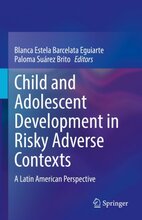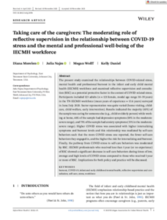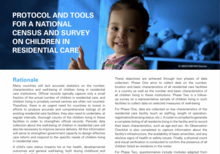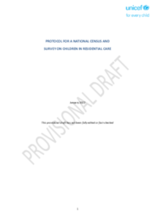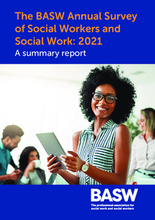Displaying 1311 - 1320 of 10391
The causes of institutionalization are multiple and the impact it causes is reflected in different areas such as the development of the child in general, such as mental, psychic structuring, health, and nutrition. Psychologically, children present alterations in their cognitive, emotional, sexual, and social domains with a high probability of developing several pathological conditions. This chapter presents an overview of this phenomenon based on several research investigations carried out in Spain, Latin America, and Mexico.
This report highlights the changing characteristics of children in and on the ‘edge of care’, including unaccompanied minors, increasing numbers of young people with unmet complex needs and BAME young people.
his study examined the relationships between COVID-related stress, mental health and professional burnout in the infant and early child mental health (IECMH) workforce and examined reflective supervision and consultation (RSC) as a potential protective factor in the context of COVID-related stress.
The Data and Analytics Section at UNICEF Headquarters developed a data collection protocol and tools for conducting a census of residential care facilities, the enumeration of children, and a survey of child well-being that can be replicated and adapted in a variety of country contexts.
This protocol for data collection on children living in residential care facilities (RCFs) aims to provide governments with clear guidance on recommended actions and steps for undertaking a census to map and enumerate such facilities and the children living in them.
This bulletin outlines the importance of disaster planning in child welfare and discusses how caseworkers, with the help of their supervisors, can prepare themselves and the children, youth, and families on their caseloads for emergencies. It also provides direction for child welfare staff on response and recovery strategies they can use should disasters occur in their communities.
In this summary report, the British Association of Social Workers (BASW) presents the findings of its 2021 annual survey providing an insight into the state
of the profession, the views of social workers and student social workers on key topics and the ongoing impact of working during the COVID-19 pandemic and beyond. The survey was launched in December 2021 as a place for social workers to reflect on their profession and their experiences in the preceding twelve months.
This report is a follow up to the ‘What Makes Life Good?’ report published in 2020 about the views of care leavers on their well-being, using pre-pandemic data collected between 2017 and 2019 through the Your Life Beyond Care survey. In this follow-up report, the authors compare the ‘What Makes Life Good?’ pre-pandemic data from 1,804 care leavers to data from 2,476 care leavers in 2020 to 2021, since the start of the COVID-19 pandemic. This has allowed them to identify priority areas that have emerged recently. Care leavers aged 16 to 25 were asked the same questions at both time points; about their living arrangements and safety, financial well-being, relationship with care workers, emotional support, stress, loneliness, overall well-being, and more.
The resource provides information about the care and support of lesbian, gay, bisexual, transgender and questioning children and youth.
The objective of the study was to evaluate the health and nutritional status of four registered orphanages of Rawalpindi, to find frequency of nutritional deficiencies by physical examination findings and to assess their dietary intake and contrast it with individual recommended daily allowances.

